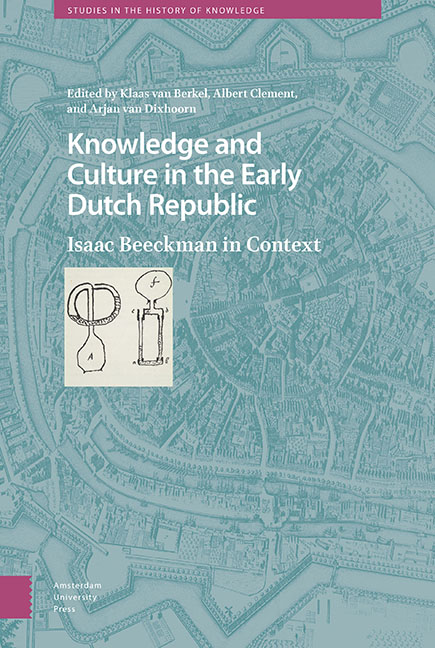15 - ‘Communicated Only to Good Friends and Philosophers’: Isaac Beeckman, Cornelis Drebbel, and the Circulation of Artisanal Philosophy
Published online by Cambridge University Press: 07 October 2022
Summary
Abstract
This chapter explores Beeckman's communicative strategies through comparison with the case of Cornelis Drebbel, a figure in whom Beeckman was highly interested. Both Beeckman and Drebbel prioritized in-person communication and tended to avoid print communication. This essay discusses some of the concerns that motivated this targeted communication as well as the conditions that made it possible and effective. A transnational network that linked Beeckman and Drebbel circulated knowledge of their works on their behalf in ways that rendered print publication unnecessary.
Keywords: Isaac Beeckman, Cornelis Drebbel, post-Reformation networks, artisanal knowledge, thermometer
In 1634, the Polish naturalist Jon Jonston (1603-1675) complained to the London-based intelligencer from Elbląg, Samuel Hartlib (c. 1600-1662), that ‘the rector of Dordrecht Beeckman has something like a thousand experiments and sounds like a great philosopher, but he is morose and incommunicative’. Indeed, the only text that Isaac Beeckman (1588-1637) published during his lifetime was his 1618 dissertation for a medical degree at Caen. This survives in only a single, incomplete imprint. Beeckman kept his extraordinary body of scientific work confined to his manuscript daily notes, the Loci communes. Yet, in Hartlib's next and only other discussion of Beeckman in his own copious daily notes, the Ephemerides, Hartlib noted Beeckman's desire to establish a ‘college of inventions’, hardly the mark of an incommunicative individual. How might we square Hartlib's two remarks and make sense of Beeckman's communicative strategies?
In his chapter in this volume, Arjan van Dixhoorn argues that Beeckman should be understood through the lens of a very long-standing culture centred on sociable communication: the consten-culture of the chambers of rhetoric, which prized joking, ingenuity, and cognitive exercises through engagement with the liberal arts. Van Dixhoorn argues that through the consten-culture, ‘explicit, bookish, academic, theoretical learning and tacit, bodily, artisanal, practical, experience-oriented knowledge had already been “interpenetrating” for two centuries’. Van Dixhoorn's criticisms of a misleading dichotomy between artisanal and textual approaches and identities are well taken. However, waves of emigration cutting across national and linguistic boundaries brought varied and sometimes competing forms of knowledge into conversation and spurred dynamic experiments in how to communicate and collaborate. Beeckman's ‘college of inventions’, which he called the Collegium Mechanicum, was one such experiment that distinguished itself from already extant forms of sociability, such as the joyful companies gathered by chambers of rhetoric.
- Type
- Chapter
- Information
- Knowledge and Culture in the Early Dutch RepublicIsaac Beeckman in Context, pp. 393 - 414Publisher: Amsterdam University PressPrint publication year: 2022

